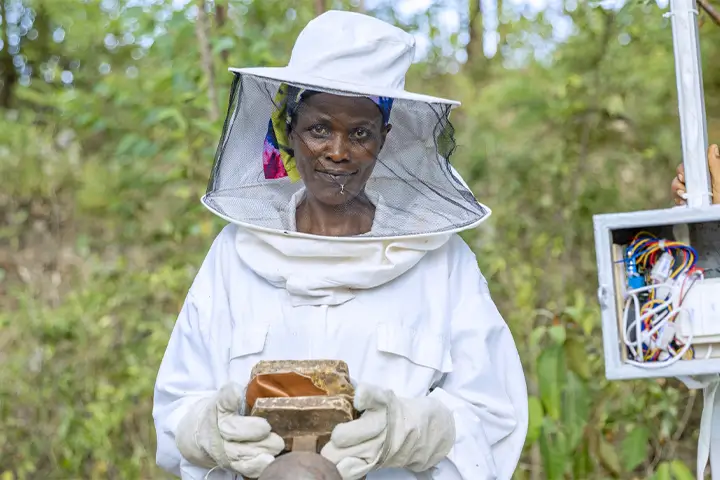
The University of Rwanda’s African Center of Excellence in Internet of Things (ACEIoT) recently conducted a specialized training session for beekeepers associated with beekeeping cooperatives in Huye and Nyaruguru districts. The training aimed to introduce beekeepers to the revolutionary Smart Bee Hive Technology (SBHT) device, developed to optimize beekeeping activities and boost honey production. The project was funded by the International Centre of Insect Physiology and Ecology (ICIPE) and implemented in partnership with NARADA Electronics Limited.
The Smart Bee Hive Technology (SBHT) Device
Elias Ntawuzumunsi, a doctoral student at the African Centre of Excellence in Internet of Things, is the mastermind behind the SBHT device. This innovative technology monitors crucial elements within beehives to ensure the well-being and productivity of bee colonies. The device is equipped with various sensors to track temperature, humidity, sound, movement inside and outside the hives, and the overall lifestyle of the bee colonies. Beekeepers can easily control these parameters remotely through their smartphones.
Moreover, the SBHT device features a digital siren to deter animals and intruders, smoke detectors to alert beekeepers about potential forest fires, and an air ventilation system that safeguards bees from harmful external air.
Inspiration and Development
Elias Ntawuzumunsi was inspired by the immense significance of honey for human health and recognized the untapped potential in Rwanda’s beekeeping industry. Through extensive surveys and consultations with beekeepers from Huye and Nyaruguru Districts, he identified their challenges and needs, which played a pivotal role in developing the SBHT device.
Collaboration and Sustainability
Damien Hanyurwimfura, Associate Professor and Acting Director of ACEIoT, emphasized the collaborative effort with NARADA Ltd to ensure the device’s viability and sustainability in Rwanda. The device’s affordability and solar-powered design make it an eco-friendly and economically viable option for beekeepers, promoting sustainable beekeeping practices.
Positive Impact on Beekeepers
The Smart Bee Hive Technology has the potential to revolutionize the beekeeping industry in Rwanda. For beekeepers like Tantina Mukanzayire from Nyaruguru District, the SBHT technology offers transformative solutions. Key issues such as the lack of adequate information about hive conditions, theft of honey produce, and colony health monitoring can now be effectively addressed with the SBHT device.
With the device’s precise monitoring capabilities, beekeepers can regulate temperature and humidity, manage colonies effectively, and ensure optimal conditions for honey production. This ultimately leads to increased honey yields and improved livelihoods for beekeepers.
Commitment to Innovation
ACEIoT’s commitment to fostering innovation extends beyond the development of the Smart Bee Hive Technology. The university has established an incubation hub that nurtures the creative ideas of its doctorate students. Through this initiative, ACEIoT actively seeks opportunities to collaborate with industry players, bringing inspiring projects to life for the betterment of the Rwandan community and beyond.
Thanks to the support from the International Centre of Insect Physiology and Ecology (ICIPE) and the dedication of the African Center of Excellence in Internet of Things (ACEIoT) at the University of Rwanda, the Smart Bee Hive Technology project has the potential to revolutionize beekeeping practices in Rwanda. By empowering beekeepers with cutting-edge technology, the university aims to enhance honey production, promote sustainability in beekeeping, and uplift the livelihoods of beekeepers across the country. Through further dissemination of knowledge and collaboration with industry partners, this innovative project can pave the way for a thriving and prosperous beekeeping sector in Rwanda.
Stay updated with the latest farming tips and agriculture industry news from Africa by subscribing to our newsletter. Don’t miss out on valuable insights and updates. Follow us on Twitter, LinkedIn, and Facebook to join our farming community and stay connected with us.



















